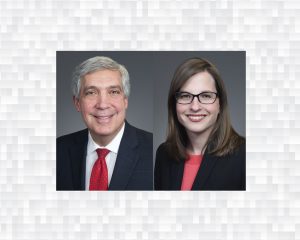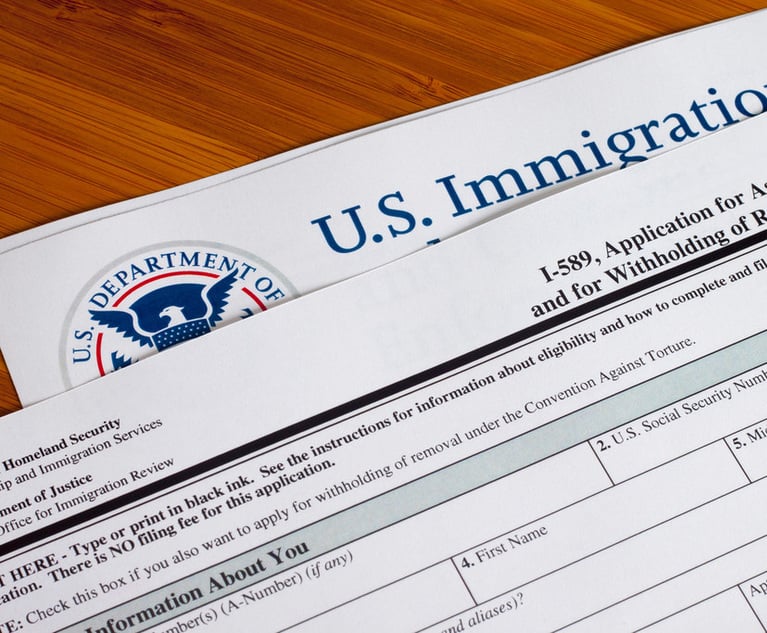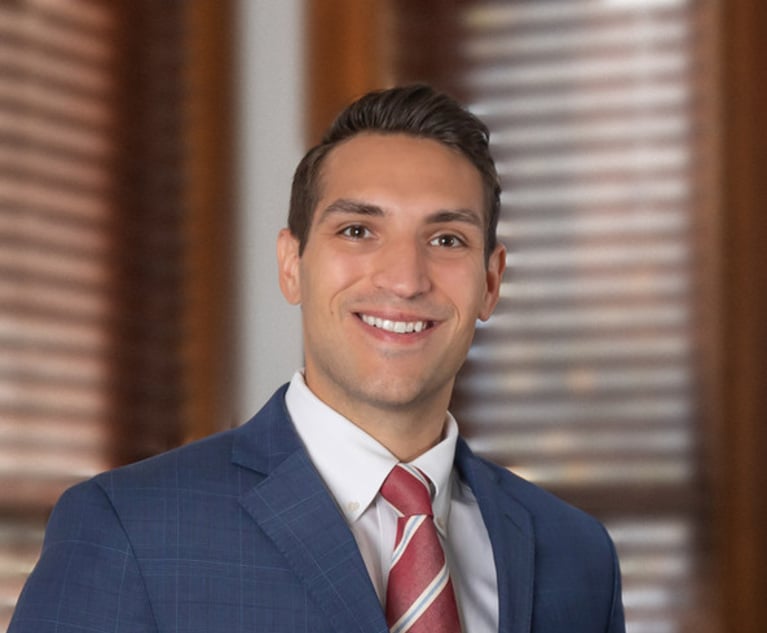In Review: 2017-18 Labor and Employment Decisions From Connecticut Supreme Court
The 2017-2018 Connecticut Supreme Court term was active in the area of labor and employment, with several important decisions.
September 13, 2018 at 05:07 PM
13 minute read
 Robert Brody, left, and Katherine Bogard, right, with Brody and Associates.
Robert Brody, left, and Katherine Bogard, right, with Brody and Associates.
The 2017-2018 Connecticut Supreme Court term was active in the area of labor and employment, with several important decisions.
Religious Schools Do Not Get Immunity From State Anti-Discrimination Laws
In Trinity Christian School v. Commission on Human Rights and Opportunities, 329 Conn. 684 (2018), the Supreme Court affirmed the order of the lower court granting the Commission on Human Rights and Opportunities' denial of a religious school's motion to dismiss an employment discrimination complaint brought by a former female employee. The Supreme Court held the denial of a motion to dismiss was not immediately appealable and religious institutions do not get outright immunity from an employment discrimination claim.
A former female employee of the religious school filed a complaint with the CHRO alleging she was terminated because of her sex, marital status, and pregnancy. The school moved to dismiss the complaint, arguing it was immune from suit under the ministerial exception to employment discrimination laws. The commission denied the motion and the school appealed. The trial court affirmed the commission's ruling. The school appealed to the Supreme Court. The court denied the appeal as it held a ruling on the motion to dismiss was not immediately appealable. Moreover, the court held that state statute §52-571b(d) does not confer religious institutions with immunity from employment discrimination claims. However, the ministerial exception can serve as an affirmative defense. This means religious institutions cannot get immediately out of any employment discrimination event claiming immunity but could ultimately win on this theory at trial.
Door-to-Door Salesmen Are Employees, Not Independent Contractors
In Kirby of Norwich v. Adm'r Unemployment Compensation Act, 328 Conn. 38 (2018), the court found individuals who sold vacuum cleaners door to door were employees, not independent contractors, for purposes of the Connecticut Unemployment Compensation Act.
Under Connecticut statute, for purposes of unemployment compensation, an independent contractor must meet the ABC test, which states, “service performed by an individual shall be deemed to be employment subject to [the act] irrespective of whether the common law relationship of master and servant exists, unless and until it is shown to the satisfaction of the administrator that (1) such individual has and will continue to be free from control and direction in connection with the performance of such service, both under his contract for the performance of service and in fact; (2) such service is performed either outside the usual course of business for which the service is performed or is performed outside of all the places of business of the enterprise for which the service is performed; and (3) such individual is customarily engaged in an independently established trade, occupation, profession, or business of the same nature as that involved in the service performed.” All three prongs must be shown for an employment relationship not to be found.
In this case, the court focused its inquiry on the third prong, i.e., part C of the test. It noted the appropriate inquiry under Part C is whether the person actually has an independent business, occupation, or profession, not whether he or she could have one. In this case, the employer put on no evidence that the workers customarily engaged in any business beyond selling the company's vacuums thus failing to meet Part C of the test. Under these facts, the court found the employer failed to show the workers were independent contractors rather than employees.
This case is important for employers as it highlights the huge exposure a company may face if employees are improperly classified as independent contractors. Employers can be on the hook for multiple unwithheld taxes, workers' compensation coverage, and the resultant fines and penalties. Therefore, it is important to conduct an analysis before simply classifying workers as independent contractors.
 Employer Can Recover on Unjust Enrichment Claim Even When a Portion of a Severance Agreement Is Invalid
Employer Can Recover on Unjust Enrichment Claim Even When a Portion of a Severance Agreement Is Invalid
MacDermid v. Leonetti, 328 Conn. 726 (2018), is a case involving a separation agreement that went sideways. The employer, MacDermid Inc., entered into a standard separation agreement with Leonetti, a 28-year employee. The company paid $70,228.51 in exchange for the release of the legal claims he might have related to his employment.
There was one catch though. The employee was injured on the job years before and received workers' compensation benefits. He wanted to carve out any claims relating to his pre-existing injury from the separation agreement but the employer refused and the employee ultimately signed the agreement without the exclusion.
In Connecticut, a workers' compensation claim cannot be waived without the workers' compensation commissioner's approval. The employee ultimately had a hearing before the commissioner to address this lack of approval and the release was not approved as it related to the workers' compensation claim.
The employer appealed and the Connecticut Supreme Court upheld the commissioner's ruling. While the workers' compensation matter was still pending, the employer brought suit against the employee for unjust enrichment, civil theft, fraud, and conversion, and sought rescission of the separation agreement. The employer argued the employee acted contrary to the purpose of the agreement, which was to make the transition as amicable and trouble-free as possible, and that he breached the provision of the agreement that provided the payment was all he was entitled to receive. Ultimately, the case was tried to a jury and the employer was awarded $70,228.51 on the unjust enrichment claim, i.e., the amount paid to the employee to release his claims. The jury found in favor of the employee on the other claims.
The employee then appealed to the Supreme Court, arguing, in part, that the unjust enrichment claim was subject to collateral estoppel in light of the Supreme Court's earlier ruling in the case.
Collateral estoppel is a doctrine that prevents a person for litigating the same issue twice. The Supreme Court, however, held the employer was not collaterally estopped from pursuing the unjust enrichment claim because the employer's claim of unjust enrichment had not been resolved when it previously addressed whether the workers' compensation claim was appropriately released. The court also weighed in on other various evidentiary issues the employee raised.
From a management-side perspective, this case is another cautionary tale. First, workers' compensation claims are not waivable without approval from the Workers' Compensation Commission. Second, resolving the issue or acknowledging the employee would be entitled to additional compensation for the workers' compensation claim might have arguably saved both the employer and employee a lot of trouble and litigation fees. On the bright side, the court seemed to side with the employer, finding the severance amount was payment for the release of all of the employee's other claims separate and apart from the workers' compensation claim. Therefore, the remaining terms of the release were valid and binding.
An Employee's Claim for Retaliation Is Not Collaterally Estopped When Brought Before the Workers' Compensation Review Board
In Williams v. City of New Haven, 329 Conn. 366 (2018), the court again grappled with the issue of collateral estoppel but this time in the context of unionized public employees. The plaintiff worked for New Haven and was injured on the job. He received workers' compensation benefits and returned to work on light duty. His light-duty position, however, conflicted with his second job. To solve this conflict, he had his doctor revise his restrictions to accommodate his second job's schedule.
Not appreciating this sleight of hand, the city terminated the plaintiff, finding he committed workers' compensation fraud in changing his light-duty demand to accommodate his second job and not for a medical reason. The plaintiff was a member of the United Public Service Employees Union and it filed a grievance on his behalf. Ultimately, the state board in arbitration found in favor of the city and the employee moved to vacate the arbitration award, but it was denied by the trial court.
In the meantime, the plaintiff filed a statutory claim with the Workers' Compensation Commission alleging he was terminated in retaliation for bringing a workers' compensation claim. The city moved to dismiss, arguing the claim was collaterally estopped because it had been decided in arbitration. The commissioner held under existing Connecticut Supreme Court precedent (Genovese v. Gallo Wine Merchants) that the employee was entitled to pursue his claims. In Genovese, the Supreme Court held collateral estoppel does not prevent a claimant from bringing a statutory cause of action even if the claim was previously brought in a grievance. The idea is employees should not have less rights because they are covered by a collective bargaining agreement and are therefore required to file for arbitration if they believe their rights were violated.
The city argued the reasoning in Genovese did not apply because the plaintiff filed his claim with the Workers' Compensation Commission and not the Superior Court, e.g., a court of competent jurisdiction. The Supreme Court, however, disagreed because while the statute was somewhat ambiguous, the decisions of the workers' compensation review board are appealable to the Connecticut appellate courts. Moreover, the whole point of the Connecticut statute is to give employees who are covered by a collective bargaining agreement the same right to bring a statutory cause of action as other employees not in a union.
Moratorium Does Not Apply to One-Third Portion of Proceeds Injured Employee Receives From Third-Party Tortfeasor
In Callaghan v. Car Parts International, 329 Conn. 564 (2018), the Supreme Court considered the extent of an employer's right to a credit against its obligation to pay workers' compensation benefits for an injured employee when the employee has recovered damages from a third-party tortfeasor who caused the employee's injuries.
Pursuant to Connecticut statute, when an employee's on-the-job injury is caused by a third party, the employee or employer may bring suit against the third party to recover damages. After deducting attorney fees and litigation expenses from any recovered amount, the employer is entitled to reimbursement for the workers' compensation benefits it paid the employee and the employee is entitled to any remaining balance. After resolution of the third-party action, the employer is liable for any additional workers' compensation benefits owed to the employee but may receive a credit for any amount the employee recovered in the third-party action. This credit is referred to as a “moratorium.”
In 2011, the Connecticut Legislature amended the statute such that if the employee brought the third-party action, the employee is entitled to one-third of the net proceeds due to the employer from the third-party action, regardless of how much the employer was owed for reimbursement. Before this amendment, injured employees would receive nothing if the benefits owed to the employer exceeded the amount recovered in the third-party action. After the amendment, the injured employee is at least assured one-third.
In the instant case, the employee was injured in a car accident while at work and brought a lawsuit against the third-party tortfeasor. The employee recovered $100,000, which after deductions for attorney fees and litigation expenses amounted to $66,000. The employer received $44,000 and the employee received his one-third share of $22,000. After the lawsuit was final, the employee incurred additional expenses and the employer refused to pay them, arguing it was entitled to a credit of $22,000 since that is the one-third amount the employee recovered in the lawsuit. The workers' compensation commissioner and Review Board agreed with the employer.
In light of the 2011 amendment, the Supreme Court disagreed with the employer, holding the language of the amendment was intended to ensure the one-third portion was for the employee's sole benefit. The employer's receipt of a credit for the one-third amount would completely eviscerate the amendment. Thus, the moratorium did not apply to the one-third of the proceeds.
This case is significant for employers because it makes clear an injured employee is entitled to at least one-third of any proceeds recovered from a third-party tortfeasor for an on-the-job injury regardless of how much the employer has paid out in benefits.
Workers' Compensation Definition for “In the Course of His Duty” Appropriate for Police Officer Indemnification Statute
In Maio v. City of New Haven, 326 Conn. 708 (2017), the Supreme Court held a workers' compensation definition for “in the course of his duty” was appropriate for a claim brought under §53-39a, a statute involving police officer indemnification. Specifically, §53-39a provides that a police officer may seek indemnification from his employing governmental unit for economic loss sustained in the defense of an unsuccessful prosecution of a crime allegedly committed by such an officer in the course of his duty.
In this case, Anthony Maio picked up an extra shift as an officer for New Haven. During his extra shift, two women accused him of sexual assault in the fourth degree, and he was placed on leave. After a criminal trial, he was acquitted. Maio then sought reimbursement from New Haven for his lost wages and attorney fees associated with his criminal trial. When the city refused to pay, arguing he had not been acting in the course of his duty at the time of the allegations, Maio brought suit pursuant to §53-39a. The city contended Maio was in a bar at the time of the allegations, which was in direct violation of city policy. Maio responded that the rule was routinely broken and thus acquiesced by his superiors.
The jury found in favor of Maio and awarded him $187,256.46 in damages. At the civil trial, however, the two women who accused Maio of sexual assault did not testify and the judge refused to allow the city to use their testimony from the criminal trial as evidence. The judge found the women were not “unavailable” under Connecticut evidentiary rules.
The city appealed and argued, in part, the definition of “in the course of his duty” read to the jury as part of the jury instructions should not have been taken from the workers' compensation guidance. The city also argued that the judge erred in refusing to admit the previous testimony of the two accusers when they failed to show for the civil trial.
The Supreme Court found the city waived its objection over the use of the workers' compensation definition of “in the course of his duty” because this issue by not timely raised. Moreover, the court concluded it would continue to interpret the statute using workers' compensation guidance until the Legislature revised the statute to direct otherwise. However, the Supreme Court did overrule the appellate court's ultimate finding as the city was entitled to a new trial because the accusers' testimony should have been admitted for the jury to hear.
Robert G. Brody is the founder of Brody and Associates. Katherine M. Bogard is an associate at the firm. Brody and Associates represents management in employment and labor law matters and has offices in Westport and New York City.
This content has been archived. It is available through our partners, LexisNexis® and Bloomberg Law.
To view this content, please continue to their sites.
Not a Lexis Subscriber?
Subscribe Now
Not a Bloomberg Law Subscriber?
Subscribe Now
NOT FOR REPRINT
© 2025 ALM Global, LLC, All Rights Reserved. Request academic re-use from www.copyright.com. All other uses, submit a request to [email protected]. For more information visit Asset & Logo Licensing.
You Might Like
View All

Settlement Allows Spouses of U.S. Citizens to Reopen Removal Proceedings
4 minute read
DOJ, 10 State AGs File Amended Antitrust Complaint Against RealPage and Big Landlords
4 minute readTrending Stories
- 1Thursday Newspaper
- 2Public Notices/Calendars
- 3Judicial Ethics Opinion 24-117
- 4Rejuvenation of a Sharp Employer Non-Compete Tool: Delaware Supreme Court Reinvigorates the Employee Choice Doctrine
- 5Mastering Litigation in New York’s Commercial Division Part V, Leave It to the Experts: Expert Discovery in the New York Commercial Division
Who Got The Work
J. Brugh Lower of Gibbons has entered an appearance for industrial equipment supplier Devco Corporation in a pending trademark infringement lawsuit. The suit, accusing the defendant of selling knock-off Graco products, was filed Dec. 18 in New Jersey District Court by Rivkin Radler on behalf of Graco Inc. and Graco Minnesota. The case, assigned to U.S. District Judge Zahid N. Quraishi, is 3:24-cv-11294, Graco Inc. et al v. Devco Corporation.
Who Got The Work
Rebecca Maller-Stein and Kent A. Yalowitz of Arnold & Porter Kaye Scholer have entered their appearances for Hanaco Venture Capital and its executives, Lior Prosor and David Frankel, in a pending securities lawsuit. The action, filed on Dec. 24 in New York Southern District Court by Zell, Aron & Co. on behalf of Goldeneye Advisors, accuses the defendants of negligently and fraudulently managing the plaintiff's $1 million investment. The case, assigned to U.S. District Judge Vernon S. Broderick, is 1:24-cv-09918, Goldeneye Advisors, LLC v. Hanaco Venture Capital, Ltd. et al.
Who Got The Work
Attorneys from A&O Shearman has stepped in as defense counsel for Toronto-Dominion Bank and other defendants in a pending securities class action. The suit, filed Dec. 11 in New York Southern District Court by Bleichmar Fonti & Auld, accuses the defendants of concealing the bank's 'pervasive' deficiencies in regards to its compliance with the Bank Secrecy Act and the quality of its anti-money laundering controls. The case, assigned to U.S. District Judge Arun Subramanian, is 1:24-cv-09445, Gonzalez v. The Toronto-Dominion Bank et al.
Who Got The Work
Crown Castle International, a Pennsylvania company providing shared communications infrastructure, has turned to Luke D. Wolf of Gordon Rees Scully Mansukhani to fend off a pending breach-of-contract lawsuit. The court action, filed Nov. 25 in Michigan Eastern District Court by Hooper Hathaway PC on behalf of The Town Residences LLC, accuses Crown Castle of failing to transfer approximately $30,000 in utility payments from T-Mobile in breach of a roof-top lease and assignment agreement. The case, assigned to U.S. District Judge Susan K. Declercq, is 2:24-cv-13131, The Town Residences LLC v. T-Mobile US, Inc. et al.
Who Got The Work
Wilfred P. Coronato and Daniel M. Schwartz of McCarter & English have stepped in as defense counsel to Electrolux Home Products Inc. in a pending product liability lawsuit. The court action, filed Nov. 26 in New York Eastern District Court by Poulos Lopiccolo PC and Nagel Rice LLP on behalf of David Stern, alleges that the defendant's refrigerators’ drawers and shelving repeatedly break and fall apart within months after purchase. The case, assigned to U.S. District Judge Joan M. Azrack, is 2:24-cv-08204, Stern v. Electrolux Home Products, Inc.
Featured Firms
Law Offices of Gary Martin Hays & Associates, P.C.
(470) 294-1674
Law Offices of Mark E. Salomone
(857) 444-6468
Smith & Hassler
(713) 739-1250











